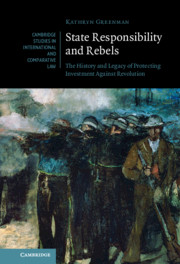Book contents
- State Responsibility and Rebels
- Cambridge Studies in International and Comparative Law
- State Responsibility and Rebels
- Copyright page
- Contents
- Acknowledgements
- Table of Cases
- 1 The Past and Present of State Responsibility for Rebels
- 2 The System: Mixed Claims Commissions in the Shadow of Empire
- 3 The Cases: Autonomy, Ambiguity and Doctrine in the Work of the Commissions
- 4 The Scholarship: Resistance and Development
- 5 The Codification Projects: Stalemate
- 6 The Legacy: Protecting Investment against Revolution in the Decolonised World
- Bibliography
- Index
- Cambridge Studies in International and Comparative Law
5 - The Codification Projects: Stalemate
Published online by Cambridge University Press: 13 August 2021
- State Responsibility and Rebels
- Cambridge Studies in International and Comparative Law
- State Responsibility and Rebels
- Copyright page
- Contents
- Acknowledgements
- Table of Cases
- 1 The Past and Present of State Responsibility for Rebels
- 2 The System: Mixed Claims Commissions in the Shadow of Empire
- 3 The Cases: Autonomy, Ambiguity and Doctrine in the Work of the Commissions
- 4 The Scholarship: Resistance and Development
- 5 The Codification Projects: Stalemate
- 6 The Legacy: Protecting Investment against Revolution in the Decolonised World
- Bibliography
- Index
- Cambridge Studies in International and Comparative Law
Summary
It was in the context of codification that struggle over the internationalisation of protection against rebels played out in its most explicit confrontation, culminating in the League of Nations’ Codification Conference held at The Hague in 1930. If the rules coming out of the arbitral practice rested on shaky and contested authority, and were inextricably tied up with practices of intervention, formal multilateral codification offered Latin American international lawyers a means to set clear and mutually agreed standards that would restrict occasions for intervention. At the same time, Anglo-American international lawyers sought to codify responsibility on their own terms. This was codification as the technical practice of elite lawyers, simply a continuation of arbitration and scholarship – a surreptitious means to universalise US ways of doing things. The attempt to reconcile the two contrasting approaches to codification and responsibility ended in stalemate at The Hague.
Information
- Type
- Chapter
- Information
- State Responsibility and RebelsThe History and Legacy of Protecting Investment Against Revolution, pp. 142 - 173Publisher: Cambridge University PressPrint publication year: 2021
